Other Manufacturers in Sportscar racing
Rondeau - Holding out for a hero
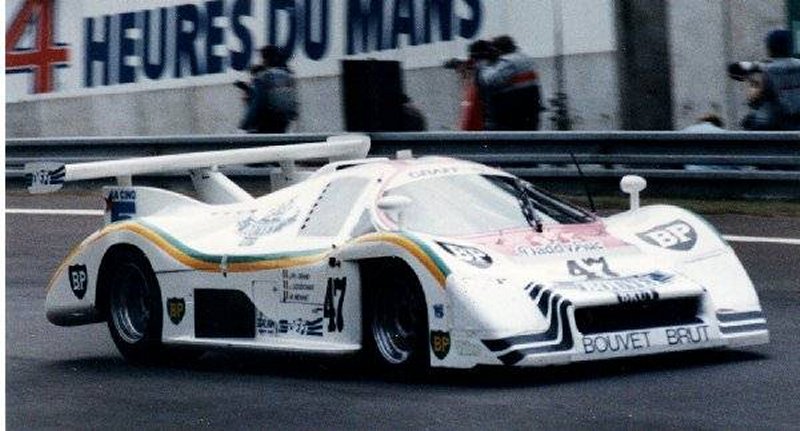
Late model Rondeau on their home track; Le Mans
Jean Rondeau became a hero of France, when he, driving a car of his own manufacture (albeit powered by a Ford Cosworth engine) took victory in the wet 1980 Le Mans 24 hour race.
The Le Mans based Rondeau team went on to become a manufacturer of Group C cars and performed well, if not quite to Porsche standards, in the early days with their radical looking cars. Sadly Jean was killed in a road accident and the team folded.
Courage - The French Robert the Bruce?
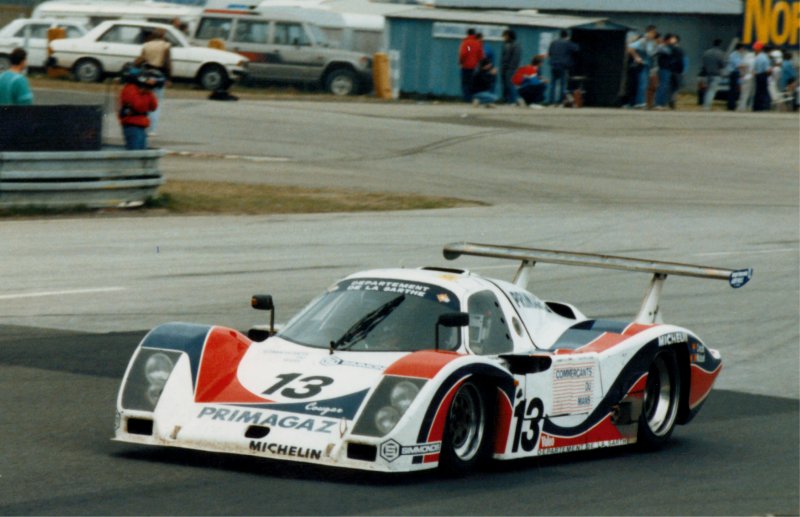
Group C, Porsche powered Courage, 1986
Yves Courage Cougar (later Courage) team have been attempting to win Le Mans for years. They get close (podiums are far from unknown), but the Le Mans based team just never seem to get the breaks to take the top step.
Starting with Porsche powered Group C cars of their own design, Courage have moved on to running open top prototypes at Le Mans, powered by Nissan, Chevrolet and Porsche engines and attract drivers of the calibre of Mario and Michael Andretti to their cars.
A sense of injustice will prevail if Courage never win Le Mans, but they really need a tie up with a major manufacturer to get an engine with enough power and good enough consumption to do the job.
BMW
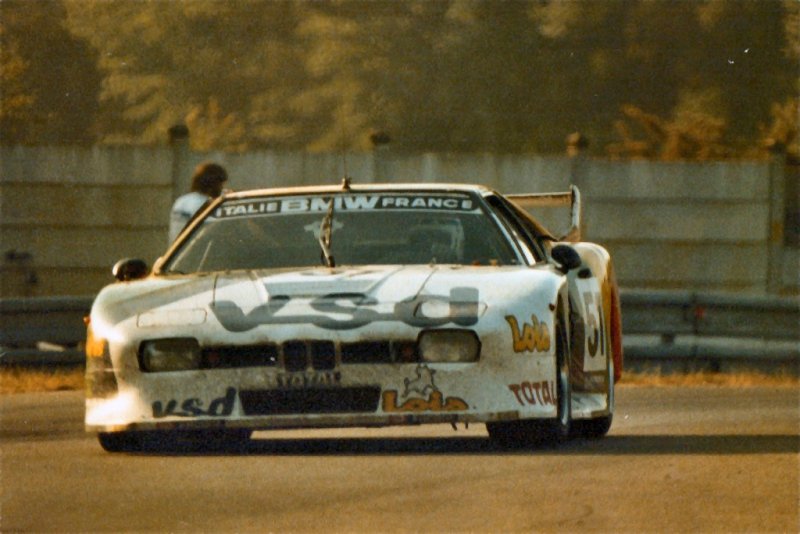
M1 in the Ford Chicane, Le Mans 1981
BMW have long been supporters of saloon car racing, but their involvement in sportscar racing is patchy. In the late 70s they produced a mid-engined sportscar, the M1. This was intended to take them head to head with Porsche in Groups 4 and 5. However, the car was never developed properly and the change to Group C arrived before the car could perform to its full potential. BMW then switched their attentions to F1, with great success.
In the 90s, McLaren turned to BMW for a bespoke V12 for their F1. This, in turn, has led to BMW making a works entry into the GT series with the Schnitzer team running McLaren F1s.
In 1999, they fitted the Mclaren's engine into a Williams F1 designed chassis and beat the nascent Audi R8s to win Le Mans with a car bearing their own name. Sadly, once that was done, they retreated back to Touring car racing.
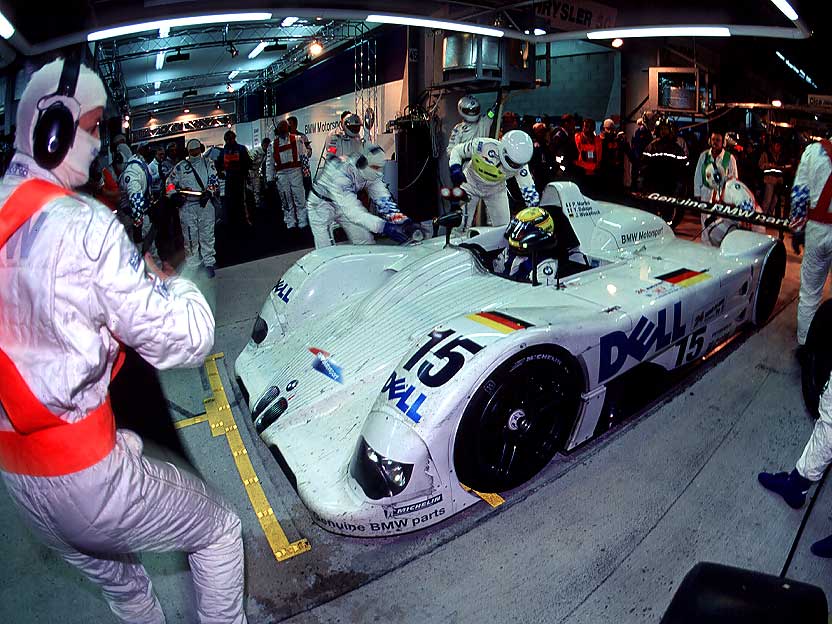
BMW's 1999 Le Mans winner takes a pitstop - Photo courtesy BMW
In the later 2000s, BMW started to appear more in GT racing, with a V8 powered M3 GTR running in the American Le Mans Series (whilst the road car featured a 6).
With the coming of a V8 road going M3, the car featured at Le Mans itself and in the ILMS and ALMS series.
In the first season of FIA GT1 a pair of 6 series BMWs (modified by and branded as Alpinas) raced, with mixed success, but they dropped out of the series in 2011.
More successful was the GT3 class Z4M V8s. Like the older M3s, this featured a V8 engine, whilst the road car came with a 6, but by now the FIA rules permitted this in GT3 and GT1.
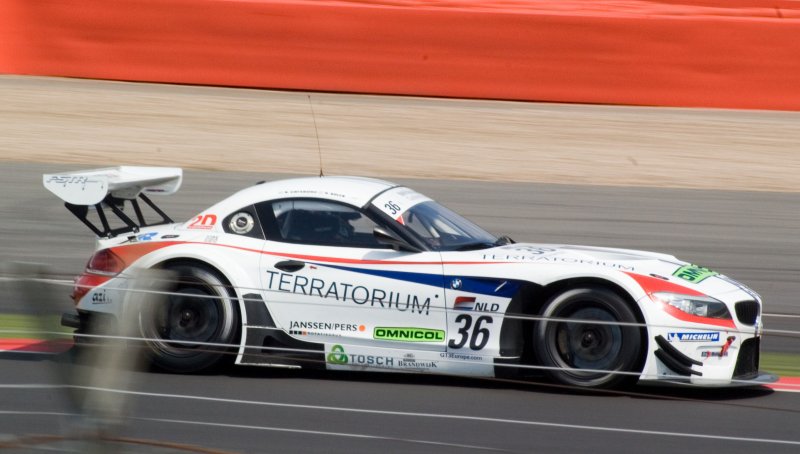
GT3 BMW Z4M with V8 engine at Silverstone, 2011
The Z4 has proven quite successful with FIA GT3 wins and a victory at the Nurburgring and Silverstone 24 Hour races.
Factory backed teams (Schnitzer in Europe and Rahal Letterman Racing in the States) also ran a pair of V8 M3s in their respective local series with some success. The cars were very quick in a straight line, but their saloon like bulk worked against them in the bends.
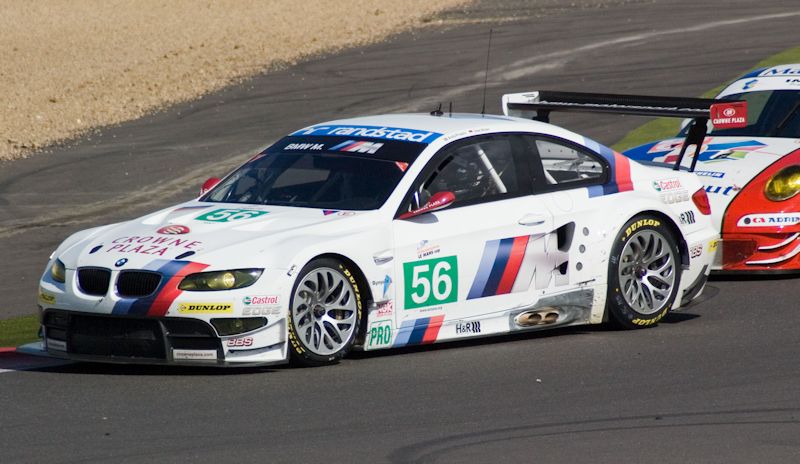
BMW M3 at Silverstone ILMC race 2011
BMW continued to be present in GT racing for a number of years, but with the arrival of the Hypercar rules they, like others, embraced the IMSA regulations and built a V8 powered car.
This raced in IMSA initially and then also appeared in the WEC, winning in IMSA and showing strongly in the WEC by 2025.
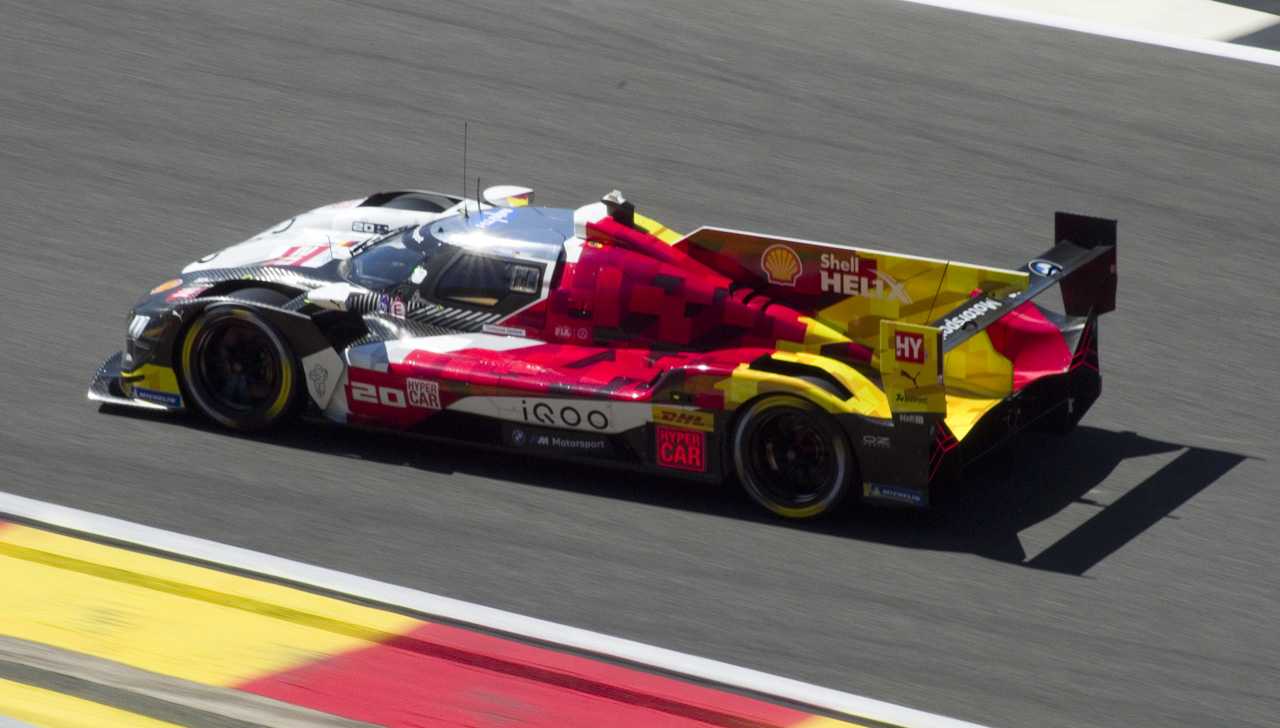
BMW Hypercar at Spa 2025
Lotus - A shadow of former glory
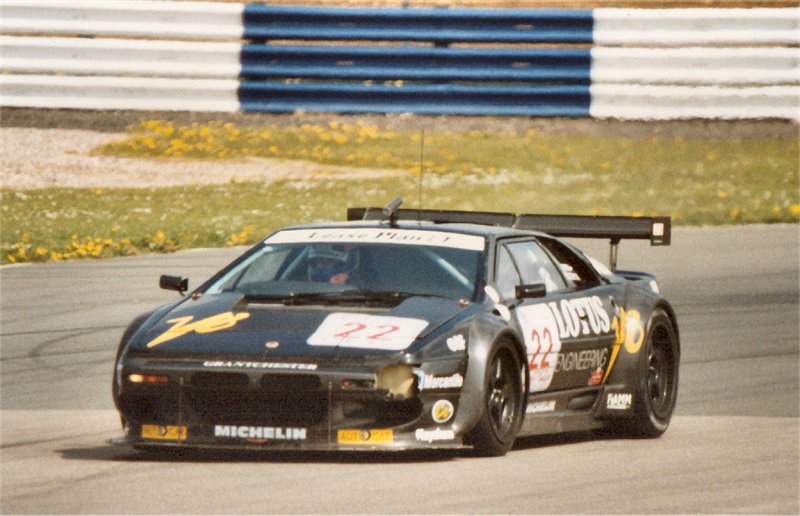
Lotus were well established in the sportscar racing arena of the 60s, but a serious falling out with the ACO, led to them withdrawing from racing at Le Mans for many years.
After Colin Chapman's death and the many changes of ownership since, Lotus finally returned to top class sportscar racing with the launch of the V8 Esprit in 1996. The car showed great promise, but was replaced for the following season with a lighter, Elise based car, the GT1.
The GT1 was hit hard by a late change of engine, when the turbocharged V8 was dropped in favour of the LT1 engine developed for the Chevrolet Corvette when Lotus was owned by GM. This seemed to disrupt development of the GT1 and, despite being a fast car by most standards, it lagged behind the McLarens and Mercedes.
Marcos - Little team, Big Impression
Marcos are a small manufacturer from Westbury, England. Like Lotus, they started off building 750 specials and grew into a fairly major manufacturer of sportscars in the 1960s. Unlike Lotus, they went bust in the 1970s and only really found their feet again in the mid-90s.
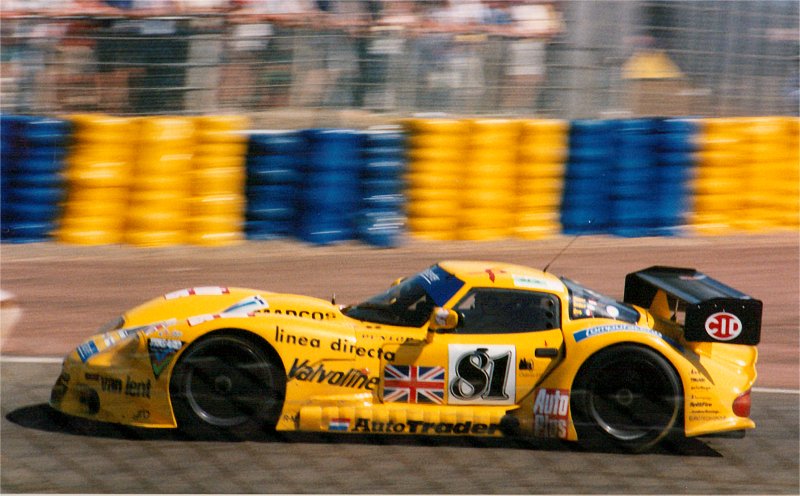
Cor Euser's LM600 at Le Mans, 1996
It was decided that the best way to make a big impact in the world of sportscars (against such luminaries as Porsche and TVR) was to go racing. The first LM500s, with modified Rover V8s were ok for domestic competition, but a more powerful and aerodynamically advanced device was needed for world-class competition.
The LM600 was powered by a NASCAR spec Chevrolet V8 of 6 litres. The team bought two cars to Le Mans in 1995, despite only competing in the UK domestic series before. The cars didn't even get classified, but, with a rumble reminiscent of the Sauber Mercedes they won the hearts of the crowd and one did make it to the end of the race, earning the team the Mechanic's Award.
In 1996, Cor Euser's semi works team ran a car in the BPR GT2 class and won its class a number of times, despite being hugely outnumbered by the Porsches.
1997 saw the Dodge Vipers drop into GT2, but the Marcos was still competitive, although the greater pressure of the V10 Dodges seemed to lead to a loss of reliability.
Marcos (especially under Cor Euser's stewardship) continue to make an impression on the international GT scene into the 3rd millenium, taking both the British and Spanish GT titles in 2000, along with a class win in the Suzuka 1000.
Even as late as 2004, and with another closure and resurrection behind it, Marcos cars continue to win races. In Spain, an LM600 looks a good bet for champion and a Mantis has won the GT Cup class a number of times in the British GT Championship.
Manufacturers who made less of an impact
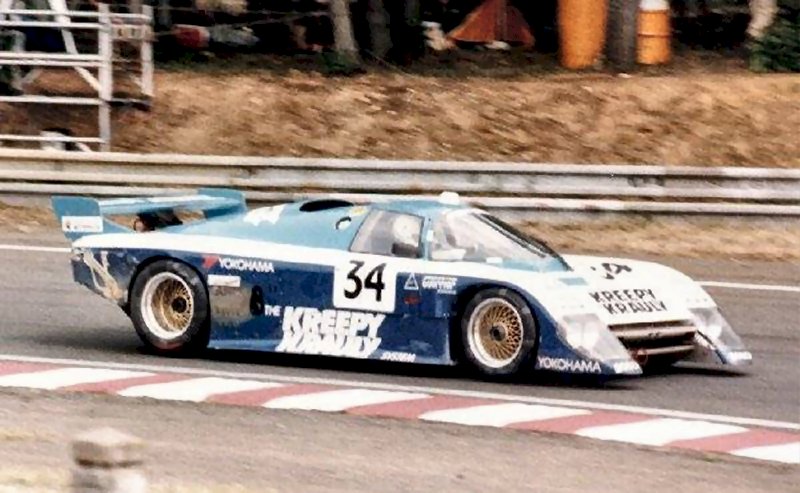
March 89G, Le Mans
Numerous other manufacturers, large and small, have come and gone from Sportscar racing.
March were a big name in racing car manufacturing and their 89G had reasonable success in IMSA in the US, but was never more than an infrequent visitor to the WSC.

Grid at Brands Hatch
The GRID was commisioned by enthusiast, Ian Dawson. Despite its impressively modern looks, the Grid was heavy and suffered from using the unreliable DFL 3.9 engine. A second chassis was run, with a 3.3 engine and it achieved a couple of top 10 placings.
Spyker - Perennial Tryers
The first GT2 Spykers appeared at Le Mans with aluminium body panels and a promised that "They would always be alloy".
The following year they were composite bodied...
The marque drew its name from the maker of Dutch fighter aircraft in WW1 and they are certainly a distinctive and welcome sight amongst all the Ferraris and Porsches in GT2.
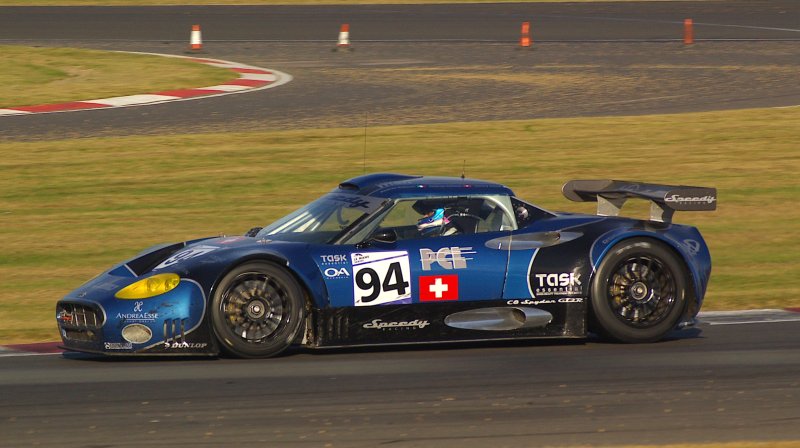
Spyker at Silverstone, 2007
The cars have never been particularly competitive, despite run meaty Audi V8s from Mader, but now and then they creep into the results by dint of reliability and I'm sure I recall one leading the GT2 class at
Le Mans in the early 2000s when retirments were particularly high.
Back To The Sportscar Racing Page
